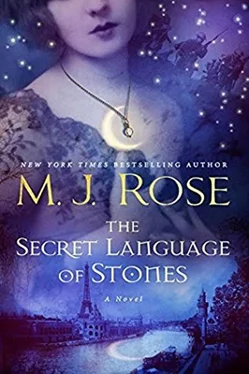“How do you know-”
“He wrote to me,” Monsieur interrupted.
I looked at Anna, wondering why she’d let all this time pass without telling me. But she looked as surprised as I was.
“Pavel, why have you said nothing before now?” she asked.
“I didn’t know before now how Opaline felt. That she thought she could have done more.” He turned back to me. “He wrote to me and said how happy he was and how much he loved you and he believed you loved him back. And having read his words,” Monsieur said, “how could I ever be anything but thankful to you? My child was not alone in his last thoughts because of you, darling girl. For that, I will always be grateful. So grateful I must make sure you understand you are in no way responsible for Grigori’s escape. He was his mother’s son. I never really faced that fact, never wanted to see it or admit it. But he was. I’ve always feared one day he would return to her and to the new Russia.” He shook his head slowly, with regret. “No, you aren’t responsible for me losing my son. But you are responsible for saving my sovereign, for protecting the Dowager.”
He kissed my forehead, and I felt one of his tears moisten my skin. “You are a gem, Opaline. And I am forever in your debt.”

I went down to my bedroom. Depleted. Exhausted. It was going to take days for me to process what had happened in England. Perhaps years to understand it. But it would have to wait. Now that I had delivered my news, there was only one thing left on my mind. And I did not know how I was going to face it or cope with it. Jean Luc was gone. He’d left when we were in the castle and he hadn’t returned. The talisman around my neck was nothing but a cold crystal bauble, as empty of magick as my soul was of hope.
I needed to return the books Madame Alouette had lent me. But first I had to finish reading the rest of his columns. I spent the next few days going over and over his words, his phrases, his insights. Grieving for him in a way I’d never grieved for anyone.
Finally, on Thursday evening, I took the walk he wrote about in his final column, the one he’d written just before meeting his death.
He’d invited his Ma chère to take a boat ride on the Seine. There were no tourist boats anymore. Not during war. But I found a tugboat and paid the captain handsomely to let me stand on the bow as he took his final trip of the day. So while twilight settled over the city, as the magical l’heure bleu descended, as the boat journeyed on the gently flowing river, I read Jean Luc’s last words and shed the last tears for him I would allow myself.
Ma chère,
As the boat takes you down the Seine, look at the people going about their lives on the banks of the river. Life goes on whether we want it to or not. Sometimes here, I think of Paris and am amazed people are still baking bread-even if it’s brown bread-and going to the museum, and walking in the beautiful gardens and washing their clothes and punishing their children. Amazed anything but this hell exists.
Does something truly exist if we are not there to witness it?
Just because I cannot see those people going about their business doesn’t mean they aren’t doing it. Just because they don’t know of my existence in this rat-infested watery trench doesn’t mean I’m not here.
I love the Seine. The river is the heart of the city. And you are the heart of my heart. The water is our lifeblood, mixing, mingling. The bridges are our hands meeting. One side connected to the other. We can’t be together in the flesh, but you can look through my eyes and see what I saw and feel what I felt. You can know that even here, so far from you, I hold your heart in me. Like the precious gift it is. And I will hold it within me always.
FEBRUARY 5, 1919
A brilliant sun warms the winter afternoon as best it can. Through an open window a bird’s song drifts in from the garden. None of the roses are blooming, but the hard tight buds will be appearing soon. Spring is only weeks away. I can hear it.
The war ended in November, and our world is slowly returning to normal. There are baguettes made of white flour in the bakeries, meat in the butcher shops, men of all ages in the street, and women are dressing up again in shimmering silks with fringes and sequins.
My great-grandmother is once more entertaining in the grand style she enjoyed before 1914. She plans to enjoy her celebrity as one of the last great courtesans as long as there are gentlemen who still arrive bearing gifts of perfume or jewels in exchange for a delightful evening’s entertainment.
I haven’t seen Madame Alouette since visiting her home to return Jean Luc’s columns, but every so often, in the pages of Le Figaro , I read about the work she and Madame Ladd are carrying on with the wounded soldiers.
The stream of grieving mothers and sisters, daughters, wives, and lovers visiting number 130 has stemmed. Our door is now open for customers shopping for jewelry to celebrate life, not grieve death. My wartime services are no longer required, and I have been relieved of my duty of freeing lost souls from their families’ mourning.
Monsieur and Anna’s youngest son, Leo, returned home a true hero. His presence has done much to relieve the sadness in the Orloff home caused by Grigori’s transgression and defection-old friends have reported seeing him in Petrograd-and the finality of Timur’s death.
My job is mine for as long as I want it, the Orloffs told me, and when and if I am ready, Monsieur is prepared to fulfill his promise. I keep the idea of a shop of my own, shining like a beacon, in my sights. I want it. I’m almost ready for it. But I feel my work at La Fantaisie Russe remains unfinished. I sense there is an important lesson still to be learned.
I returned home to Cannes, as promised, a month after the war ended, to study with my mother. This time, I wanted to. I was both anxious and eager to claim my heritage and understand it. Over dinner one night, I gave her back the ruby necklace I’d stolen from her that day at the dock and was surprised when she smiled and told me she’d been happy when I took it. It was a rite of passage for women like us, for Daughters of La Lune, to strike out on their own, she’d said.
Now back at La Fantaisie Russe, in the glorious Palais Royal, I am alone in the workshop. Monsieur has taken an assortment of bracelets and rings to a client’s home for a private showing. Anna works in the front of the shop. Leo, who’s taken up his old spot at the other workstation in the studio, is down in the vault, overseeing the repairs. The crevice through which I’d seen the Bolsheviks meeting-as it turned out the men I’d seen weren’t German spies after all, but Russians working with Grigori-has been cemented over, but the walls need fortification.
As I sit at my station, setting pearls into a diadem for a wealthy New York socialite visiting Paris and staying at the nearby Ritz Hotel, the bell rings, signaling a customer, and I hear Anna open the door and welcome someone in.
“I’m hoping you might be able to help me?” A man’s voice. A honeyed voice, deep and rich like caramel.
“Of course, Monsieur,” Anna says.
“My mother purchased this here last year. And these gold threads broke. Might you be able to repair it? It’s quite dear to her. It has my hair in it.”
“But of course,” Anna says, then hesitates. “This is one of our lockets, but how can it be?” She sounds incredulous.
I put down my tools and take a step closer to the door.
Читать дальше













